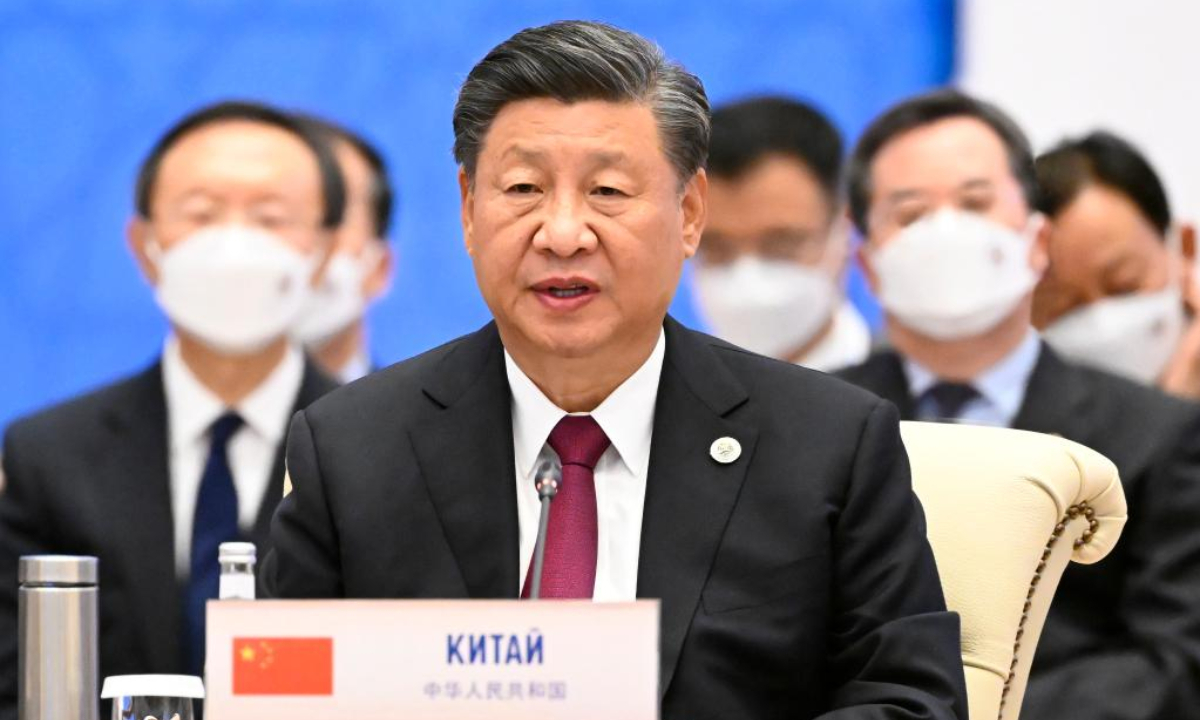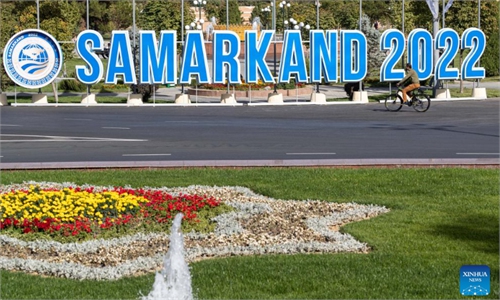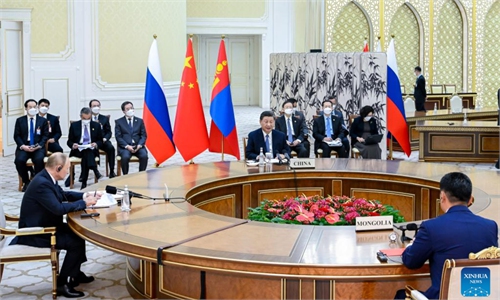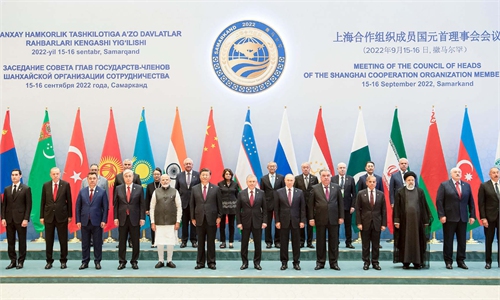Peace and development: key message of President Xi's Central Asia visit before the Party Congress

Chinese President Xi Jinping makes remarks while attending the 22nd meeting of the Council of Heads of State of the Shanghai Cooperation Organization (SCO) at the International Conference Center in Samarkand, Uzbekistan, Sep 16, 2022. Photo:Xinhua
Chinese President Xi Jinping just concluded his visit to Central Asia and attendance of the Shanghai Cooperation Organization (SCO) Summit. As the much anticipated, twice-in-a-decade national congress of the Communist Party of China (CPC) is only less than one month away, this visit, naturally, attracts much attention from international observers: what is the key message of President Xi's first travel overseas since the pandemic began? What is China's solution to the challenges in this complex and uncertain world?
Under the leadership of President Xi, China has committed itself to advancing dialogue and cooperation, promoting unity and openness, and safeguarding peace and development. As a constructive force in international relations, China is playing an increasingly important role in ensuring the long-term stability and sustainable development of the world. To promote peace and security, the two defining themes of our times, and address global challenges, President Xi has proposed the Global Security Initiative (GSI) and Global Development Initiative (GDI). The Central Asian visit gives us some rough ideas about how these two initiatives are relevant to the region and the world.
Preserving peace with a new approach to security
Peace and security are interdependent. In today's world, profound changes in major-power relations, the spillover of geopolitical conflicts, the resurgence of unilateralism, group politics and the Cold War mentality, and the emergence of non-traditional security issues have all created immense pressure on global peace and security. This is why China proposed the GSI: to address the peace deficit and pursue security for all, by promoting a shared commitment to common, comprehensive, cooperative and sustainable security.
During the SCO Summit, President Xi further elaborated this initiative to the participating leaders, especially its unique value on resolving issues like Afghanistan. He called for a balanced, effective and sustainable security architecture, and announced substantive measures to help maintain peace and security in the region, including training 2,000 law enforcement personnel for SCO member states in the next five years and setting up a China-SCO base for training counter-terrorism personnel.
When meeting bilaterally with Central Asian leaders, President Xi reiterated China's support for their efforts to uphold national independence, sovereignty and security, and voiced opposition to external interference in domestic affairs. China's commitment to cooperation and show of support were widely applauded by the Central Asian leaders, which will generate even stronger momentum for security cooperation among regional countries under the GSI.
Pursuing development through open and inclusive cooperation
As President Xi noted in his SCO speech, "Human society has both sunny and rainy days in its development." And the global picture of development is by no means sunny at the moment. Supply chain disruptions, energy and food crises as well as uncertainties caused by the pandemic and regional conflicts are putting economies under strain. The deficit in development has only widened in recent years, and members of the Global South are finding it even more difficult to meet the Sustainable Development Goals (SDGs). People around the world are looking for a solution to these problems, a way to navigate through the "rainy days". Many have shared their ideas, and China's proposal, most aptly captured by the GDI, is for countries to foster a global development partnership for "more robust, greener and more balanced global development".
Being close neighbors of China, the Central Asian countries are well positioned to play a leading role in delivering the vision of the GDI and benefit from its implementation, just as their active participation in the Belt and Road Initiative (BRI) has proven. Since the launch of the BRI nearly a decade ago, major infrastructure projects like the China-Kyrgyzstan-Uzbekistan highway and the China-Kazakhstan-Uzbekistan railway have helped Uzbekistan, a land-locked country on the ancient Silk Road, transform into a land-linked country. The China-Kazakhstan International Logistics Base in the coastal Chinese city Lianyungang has made it possible for Kazakhstan to ship its products through the Pacific Ocean to the world.
To further development cooperation with its Central Asian neighbors, President Xi pledged to step up cooperation in a broad range of areas, including agriculture, energy, supply chains and innovation. He also announced the plan to provide developing countries in need with 1.5 billion RMB yuan worth of emergency humanitarian assistance, and offer satellite data services to support regional countries in agricultural development, connectivity and disaster mitigation and relief. Aligned with the needs of Central Asian countries, the GDI will open up broader prospects for sustainable development in the region.
The Party Congress will reinforce China's commitment to peace and development
Unsurprisingly, as the 20th CPC National Congress will soon be convened in October, the world is all eyes on China. People outside China are eager to learn what new policies China would introduce after the Party Congress and what they mean to the world.
During his visit, President Xi has answered some of these questions by conveying a message of confidence, a message warmly received by his counterparts. The CPC will "formulate programs of action and overarching policies to meet China's new development goals" and "new expectations of the people", President Xi said. Demonstrating China's unwavering commitment and sense of responsibility, he also reaffirmed that the country will continue to promote the building of a community with a shared future for mankind, create new opportunities for the world with new advances in its development, and contribute its vision and strength to world peace and development and human progress.
Actions speak louder than words. This is a value cherished in China and across the world. As uncertain as the journey ahead may be, one thing is certain: China, under the leadership of the CPC, will remain as committed as ever to peace and development of the region and being a force for good in the world.



